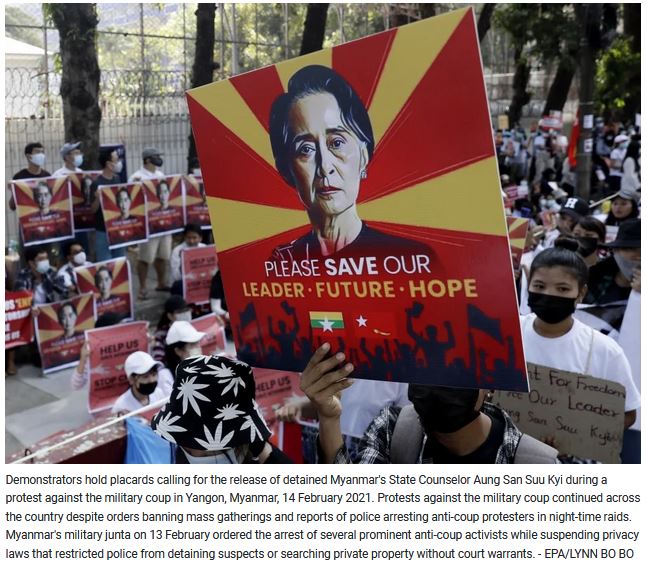It's karma for Suu Kyi
Emeritus Professor Tan Sri Dato' Dzulkifli Abdul Razak
Opinion - New Straits Times
February 15, 2021
ON Feb 1, an unexpected coup was launched in Myanmar, taking the world by surprise. Some, however, were less so because of their belief in the force of karma.
In fact, they argued that the event was a karmic consequence on Aung San Suu Kyi, who is known to have offered support to the Myanmar military, the Tatmadaw, by covering up and even defending them in relation to the alleged Rohingya genocide.
She even appeared before the International Court of Justice (ICJ) in The Hague to deny the accusations of genocide that were pointed to the military. Others use this to leverage criticism against Myanmar's democracy led by Suu Kyi as a farce, since the Rohingya community was deprived from exercising their voting rights.
This is made worse by the various purported crimes towards this community, including ethnic cleansing and violation of international human rights in very many blatant ways, especially against women and children. Others called it state terrorism.
Towards this end, as recent as August 2017, some 740,000 Rohingyas were forced to flee from Rakhine State to the neighbouring country due to operations that the United Nations deemed as genocidal. Those who left for Bangladesh after a military crackdown reportedly "celebrated" the coup and the detention of Suu Kyi by the Tatmadaw.
Regarded as the country's de facto leader, she hesitantly, at the time, and publicly came to the defence of the Myanmar atrocities at the ICJ hearing in 2019. "She is the reason behind all of our suffering," to quote a Rohingya community leader, Farid Ullah, from Kutupalong — the world's largest refugee settlement.
The unfolding of the coup is an interesting development because "karma" is often quoted as a term that refers to the spiritual principle of cause and effect. Accordingly, the karma of an individual can be said to influence the future of that individual based on their intent and deed (as the cause).
As a rule of thumb, it postulates that good intent and good deeds contribute to good karma, while bad intent and deed otherwise. It is also juxtaposed to the concept of "rebirth" as part of the philosophy of karma, and is well ingrained in many schools of thoughts, such as in Hinduism, Buddhism, Jainism, Sikhism, as well as Taoism.
Karma, within this understanding, is able to affect one's future in the current life, as well as the nature and quality of future lives. Apparently, where a bad or evil karma is involved, a Myanmar tradition resolves this by the beating of metal and tin materials to drive away the undesirable karma.
This explains why many protesters who are against the coup were seen noisily banging metal pots, pans or buckets as part of the civil disobedience campaign involving mainly youngsters and students.
This must now be taken in the context of what took place in The Hague, where Suu Kyi's office said she would fly to "defend the national interest". There, she reportedly sat impassively through graphic accounts of mass murder and rape perpetrated by Myanmar's military at the start of a three-day hearing on allegations of genocide at the UN's highest court.
"I stand before you to awaken the conscience of the world and arouse the voice of the international community," Abubacarr Marie Tambadou, the Gambia's attorney-general and justice minister, said as he opened his country's case against Myanmar at the ICJ on Dec 10. "In the words of Edmund Burke: 'The only thing necessary for the triumph of evil is for good men to do nothing.'
"Another genocide is unfolding right before our eyes, yet we do nothing to stop it," he said. "This is a stain on our collective conscience. It's not only the state of Myanmar that is on trial here, it's our collective humanity that is being put on trial."
The village of Min Gyi was a case in point, drawing on witness accounts recorded in a report by UN investigators, who estimated 750 people were killed there, including more than 100 children under the age of 6.
The court was also told of "extrajudicial killings, rape or other forms of sexual violence, burning of homes and destruction of livestock… calculated to bring about a destruction of the Rohingya group in whole or in part".
Suu Kyi's fast-fading legacy is arguably giving birth as a darker consequence of the karma. As commonly understood: what goes around comes around.
The writer, an NST columnist for more than 20 years, is International Islamic University Malaysia rector

